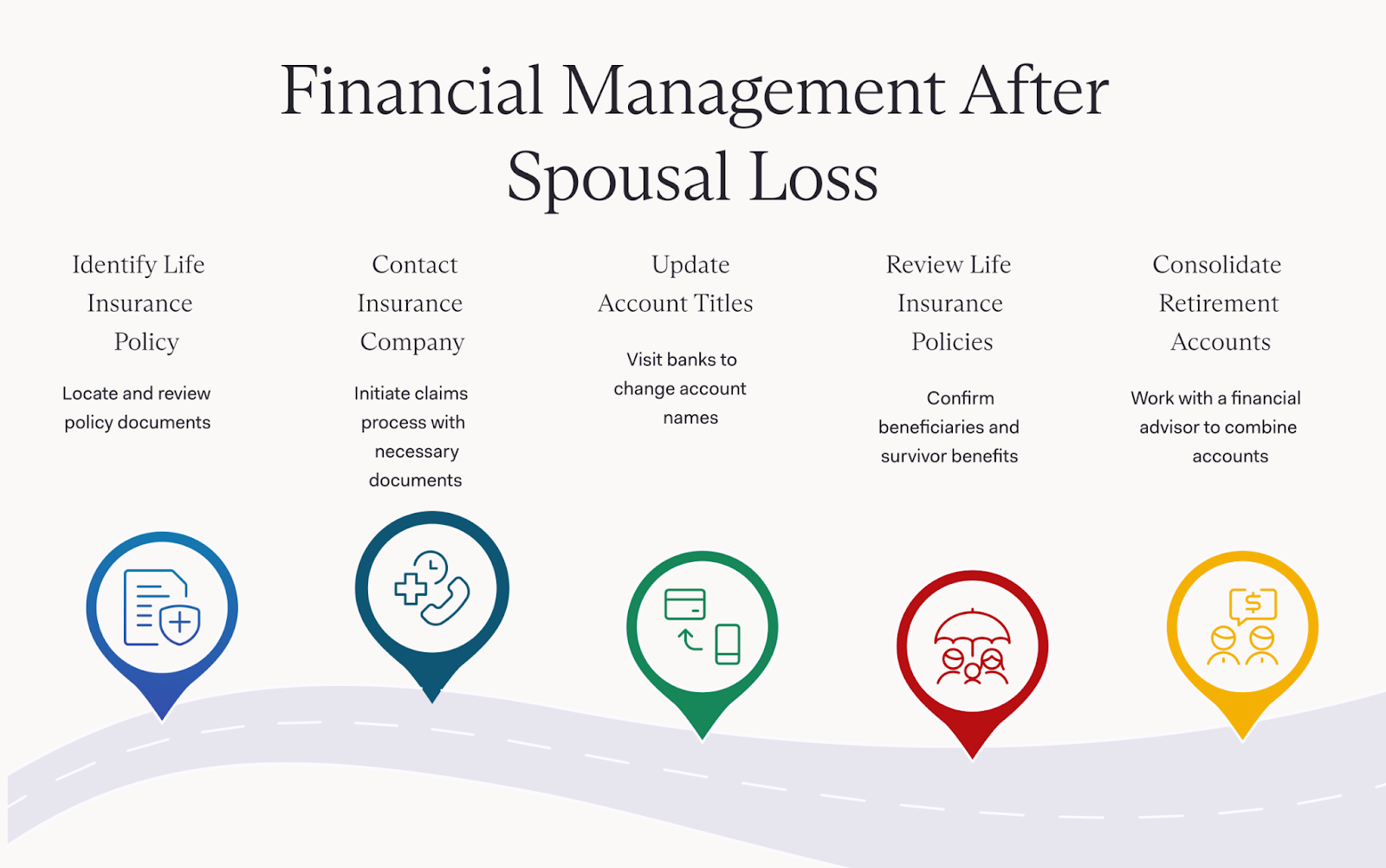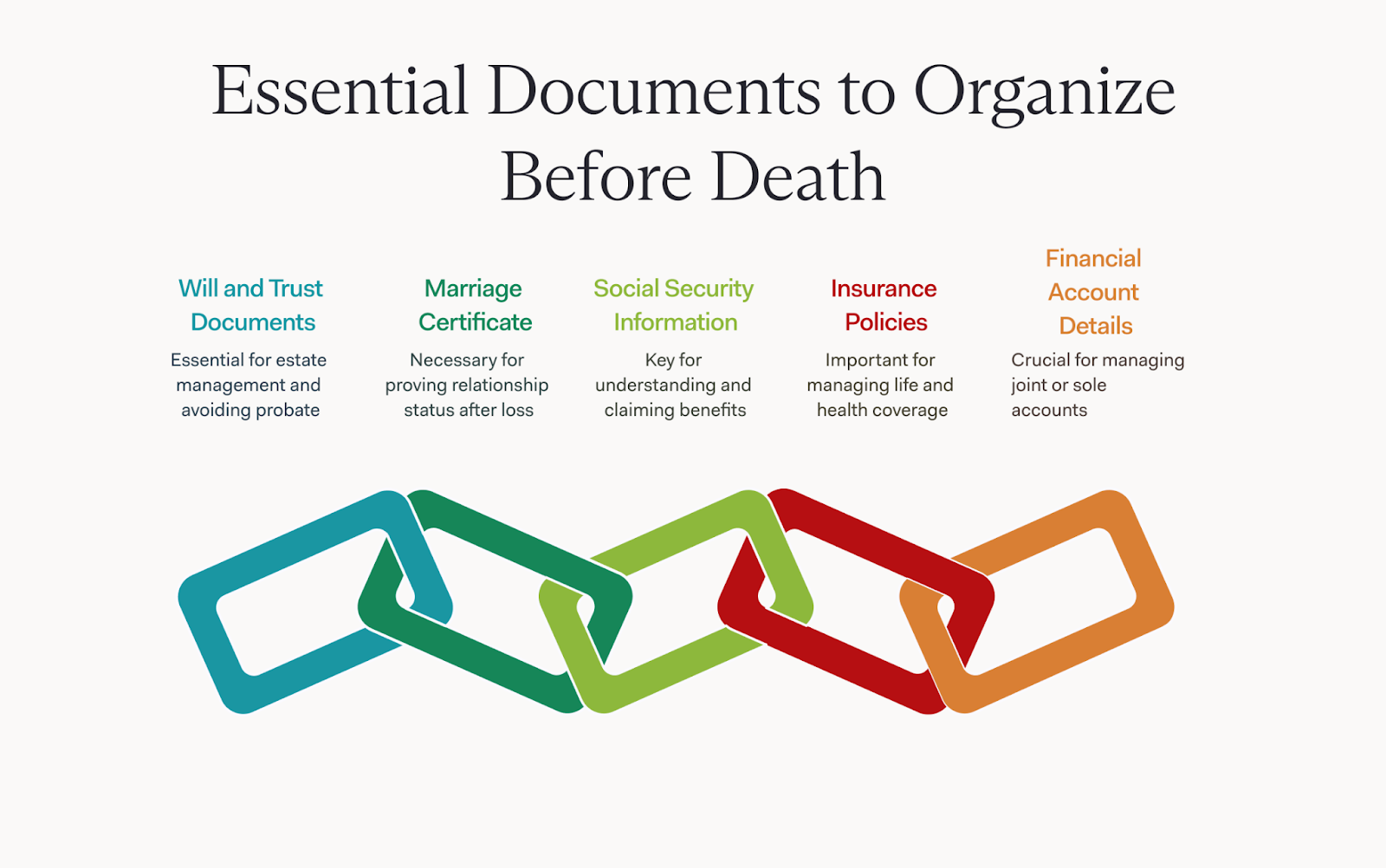Navigate the difficult journey of losing a spouse with our essential guide. Discover key steps to prepare and find support.
Losing a spouse is devastating. Beyond the grief, you suddenly face countless decisions without your partner. The question "How can I manage our finances alone?" often emerges during this difficult time. Remember that organizing your financial matters, while challenging, can provide a sense of control when you need it most.
This checklist guides you through essential financial steps after losing your spouse - from collecting life insurance to updating accounts. Moving through these tasks at your own pace can help establish some stability during this challenging transition.

Documentation is a critical first step. You'll want easy access to wills, marriage certificates, and more.

Begin by locating and organizing will and trust documents. These papers show who gets what after someone dies. They also name the person in charge of settling the estate. This step helps streamline the probate process, saving time and stress.
A well-organized will speeds up the probate process.
Keep these documents safe but accessible. Tell a trusted family member or your estate planning attorney where they are. Updating them regularly ensures they reflect current wishes and financial situations.
Your marriage certificate may be needed after a spouse dies to prove your relationship for certain benefits and legal matters. However, it may not be required if you're already receiving benefits on your spouse's record or if your relationship is verified by other legal documents such as the death certificate.
Social Security information is also key. You can contact the Social Security Administration at 1-800-772-1213. They can help you understand social security benefits available to you, like survivor benefits.
Having these documents ready makes the next steps easier as you manage financial matters after loss.
With essential legal documents in order, turn your attention to insurance policies and financial accounts. Gather copies of all insurance policies. These include life insurance, health coverage, and any other relevant plans.
Make sure to check the beneficiary details. This will help in claiming benefits after your spouse's death.
Next, look at financial accounts linked to you or your spouse. Check joint bank accounts, credit accounts, and retirement plans. Note who owns these accounts—are they joint or sole owner? Before closing any unnecessary credit accounts, check for outstanding balances and consult a financial advisor about the potential impact on your credit score.
Keep track of all important documents in a filing cabinet for easy access later on.
Professional guidance is invaluable during this time. A good estate planning attorney can guide you through the process and protect your interests. Meeting with a financial advisor is also smart—it can help you plan for your future after losing your spouse.
Estate planning attorneys provide crucial support during this difficult period. They understand the legal steps after a spouse's death, including handling wills and trusts, which provide instructions for asset distribution.
You'll want to make sure your spouse's final wishes are honored.
Working with an estate lawyer also helps with filing necessary documents like the death certificate. They know what forms you'll need for insurance claims and benefits. It may be beneficial to find someone who specializes in estate matters for added support.
Losing a loved one is difficult, and navigating financial decisions during this time can feel overwhelming. From managing funeral costs to handling debts, a financial advisor can provide guidance to help you stay on track. This is also the right time to review life insurance policies and assess any benefits you may be eligible for, such as pensions or survivor benefits.
A Farther financial advisor can walk you through these steps with clarity and care. They'll help you collect life insurance payouts, manage retirement accounts, and create a financial plan that supports your future.
You don't have to handle this alone. Talk to an advisor today for expert support.
Proper notifications are an essential step. This includes banks, insurance companies, and the Social Security Administration.
The Social Security Administration offers crucial support for surviving spouses. You must notify them about your spouse's passing. This usually requires a copy of the death certificate.
The agency may offer survivor benefits, which can help with financial needs.
You will need to provide some personal information too, like your spouse's Social Security number and marriage details. It's smart to contact this office early on. They can guide you through the process and explain what benefits you might be eligible for, whether it's monthly payments or other assistance options.
Contact banks and financial institutions right away. You'll need to notify them of your spouse's passing. Bring copies of the death certificate for each bank account and loan. This helps close accounts or update names on joint ones.
Ask about any loans, credit cards, or mortgages in your spouse's name. You may have liability if you are a co-signer. Don't forget life insurance policies as well; these can provide much-needed funds during this time.
Check if your spouse had an account with their employer's retirement plan too—these funds could be vital later on.
After notifying financial institutions, turn to your insurance companies. You'll need to contact their life insurance companies. They can guide you through the claims process for benefits. Gather important documents, like the policy itself and your spouse's death certificate.
This will help speed things up.
Talk to your spouse's employer too. They may offer survivor benefits that could assist you financially during this tough time. Be sure to collect all necessary forms and keep multiple copies for yourself—it makes life easier down the road.
Now, let's go over the key financial steps to take after a loss.
Managing finances requires specific actions. Collect life insurance benefits, update account titles and beneficiaries, and consolidate retirement accounts. These steps help ensure your finances stay on track.
Life insurance can provide crucial financial support after losing your spouse. To collect benefits, first, find the policy documents. Contact the insurance company to start the claims process.
You will likely need a death certificate and other forms.
Stay informed about deadlines for claiming benefits. Some policies require you to act quickly. Once approved, these funds can help cover funeral expenses or bills. Make sure to review how they fit into your complete financial plan.
Account updates require prompt attention. After your spouse passes, it's time to make changes. Visit banks and financial institutions to alter the names on accounts.
You'll want to ensure that only you or other chosen individuals have access.
Review life insurance policies too. Confirm who will receive any benefits. Survivor benefits may apply, so check this with your spouse's employer or financial advisor. Keeping everything current helps prevent issues later on—get started as soon as possible!
Simplifying your financial landscape can be beneficial. After losing your spouse, this step is crucial. You may have multiple accounts, like 401(k)s and IRAs. Combining them helps keep track of investments.
Contact a financial professional for guidance on this process. They can help you roll over funds into one account. This move could also save on fees and maximize benefits. Make sure to check if you're eligible for survivor benefits that can boost your retirement savings too.
Financial reassessment is necessary during this transition. Look at your current budget and see what changes you need to make. Adjust your long-term goals too, since things may look different now.
A thorough budget review is essential. Start by listing all income sources, like Social Security benefits or life insurance payouts. Write down every expense too—like bills and daily costs.
Look closely at where you can save money. You might need to adjust goals for the future if things have changed. If you're not sure what to do, meet with a financial advisor. They can help you create a plan that fits your new situation and needs.
Take your time making these changes; it's important to be careful during this tough time.
With your budget assessed, now focus on long-term planning. Losing your spouse may change how you think about money. Your needs and priorities can shift quickly after such a loss.
Start by reviewing savings for retirement and expenses like education for a child in college. You may be eligible for survivor benefits or financial aid from the government or insurance providers.
Update your plans based on changes in income or necessary expenses. This might mean working longer, changing investments, or even consulting with an elder law attorney to protect assets.
Adjusting these goals helps secure your future while you're grieving and trying to rebuild your life.
Preparing for the death of a spouse is hard. This checklist can help ease some of that burden. Start by organizing important documents like wills and insurance policies. Then, seek legal and financial support to guide you through this process.
Don't forget to notify key institutions such as banks and Social Security. Managing essential tasks will ensure you secure benefits and update accounts correctly. These steps matter—they can save time, money, and stress later on.
Search for resources or support groups if you're feeling overwhelmed. The more prepared you are, the smoother things will go during this tough time.
The first step is to make a list of all major financial matters, such as contacting your spouse's card issuers and notifying three major credit bureaus - Equifax, Experian and TransUnion.
You can engage with a funeral director at your chosen funeral home to help you arrange whether you need to cremate or hold a traditional burial service based on your loved one's final wishes.
It would be wise to delete or memorialize their social media accounts. This prevents unauthorized access and respects the privacy of your late partner.
Yes, contact government agencies like U.S Veterans Administration for potential spousal benefits and talk to a financial advisor for guidance on managing finances during this period.
Consider joining support groups where people share similar experiences; they provide emotional assistance while you grieve. It may also help if family members are involved in estate planning documents preparation process.
Definitely! Consult a professional to ensure appropriate forms are filled out correctly. You might also consider seeking advice from an experienced financial advisor regarding retirement planning and health insurance concerns.